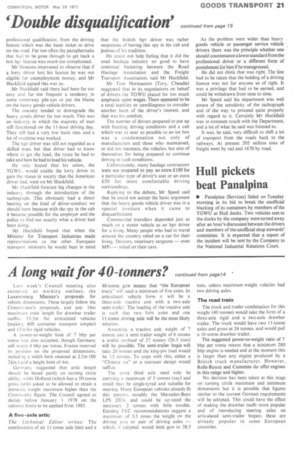'Double disqualification' continued from page 15
Page 23

If you've noticed an error in this article please click here to report it so we can fix it.
professional qualification, from the driving licence which was the basic ticket to drive on the road. Far too often the paraphernalia that had to be gone through to get back a lost hgv licence was much too complicated.
Mr Simeons intervened to observe that if a lorry driver lost his licence he was not eligible for unemployment money, and Mr Huckfield agreed this was so.
Mr Huckfield said there had been far too easy and far too frequent a tendency in some motorway pile-ups to put the blame on the heavy goods vehicle drivers.
The country tended to downgrade the heavy goods driver far too much. This was an industry in which the majority of men still functioned on the 11-hour driving day. They still had a very low basic rate, and a lot of overtime was worked.
The ligy driver was still not regarded as a skilled man, but that driver had to know where to get the load, the route he had to take and how he had to load his vehicle.
He only hoped that his union, the TGWU. would enable the lorry driver to gain the status in society that the American driver had. went on Mr Huckfield.
Mr I lucktield forecast big changes in the indusir. through the introduction of the tachograph. This obviously had a direct bearing on the kind of driver-conduct we should have because with the spy in the cab it became possible for the employer and the police to find out exactly what a driver had been doing.
Mr Huckfield hoped that when the Minister for Transport Industries made representations LO the other European transport ministers he would bear in mind
that the British hgv driver was rather suspicious of haying this spy in his cab and jealous of his tradition.
He could not help feeling that it did the road haulage industry no good to have continual bickering between the Road Haulage Association and the Freight Transport Association, said Mr Huckfield.
Mr Tom Normanton (Tory, Cheadle) suggested that in its negotiations on behalf of drivers the TGWU placed far too much emphasis upon wages. There appeared to be a total inability or unwillingness to consider another facet of the driver's interest, and that was his comfort.
The number of drivers prepared to put up with freezing driving conditions and a cab which was as near as possible to an ice box was a condemnation not only of manufacturers and those who maintained, or did not maintain, the vehicles, but also of themselves for being prepared to continue driving in such conditions.
Unfortunately, many haulage contractors were not prepared to pay an extra £.100 for a particular type of driver's seat or an extra £50 for more comfortable driving surroundings.
Replying to the debate, Mr Speed said that he could not accept the basic argument that the heavy goods vehicle driver was in a special position when it came to disqualification.
Commercial travellers depended just as much on a motor vehicle as an hgv driver for a living. Many people who had to travel around the country relied on a car for their living. Doctors, veterinary surgeons — even MPs — relied on their cars. As the problem went wider than heavy goods vehicle or passenger service vehicle drivers, there was the principle whether one should countenance a lower standard from the professional driver or a different form of punishment for him if he transgressed.
He did not think that was right. The line had to be taken that the holding of a driving licence was not for anyone as of right. It was a privilege that had to be earned, and could be withdrawn from time to time.
Mr Speed said his department was well aware of the sensitivity of the tachograph and of the way to proceed quite properly with regard to it. Certainly Mr Huckfield was in constant touch with the Department, and a lot of what he said was listened to.
It was, he said, very difficult to shift a lot of transport from the roads back to the railways. At present 205 million tons of freight went by rail and 1670 by road.




































































































